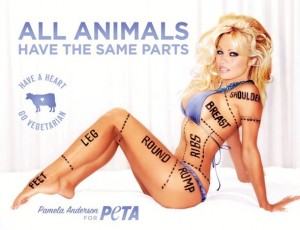For the RCL post this week we’ve been assigned to pick an advocacy campaign and argue whether or not they use persuasion or propaganda.
The first advocacy campaign that came to mind was People for the Ethical Treatment of Animals, or more commonly known as Peta. For awhile now, there has been mixed feelings about this particular advocacy campaign. It cannot be refuted that this organization strives for an excellent goal: better treatment of animals. However, looking at purely advertisements, this advocacy group has run into major resentment from the public and,now, are known for having atrocious ads.
Below are just a few of the most shocking advertisements endorsed by Peta:
It can be seen from even these examples that Peta uses propaganda to sway the opinion of their audience rather than persuasion. Not only are many of these ads tactless, but many of them aren’t true to the facts, such as the “Got Autism?” ad which linked drinking milk to having autism. Peta’s advertisements continually use female body image to attract attention as well as celebrity endorsers. The purpose of these ads is to grab the viewer’s attention, no matter in what way. While Peta is trying to send an ethical message to the public about the maltreatment of animals and gain support for their cause, their propaganda turns most away from the advocacy group. Many people disagree with their ads and find them highly offensive. Unfortunately, because of this, Peta has now become the butt of a few jokes and has even lost some support from the public. Their use of propaganda has affected their image in the public’s eye. For many people, when they think of Peta, they think of the organization’s bold propaganda rather than the good deeds they are trying to accomplish. Most of their ads are not reliable and, therefore, make the advocacy campaign unreliable.
Maybe if Peta used persuasion instead of propaganda they would have a much better reputation and many more supporters.






